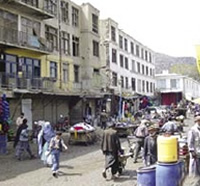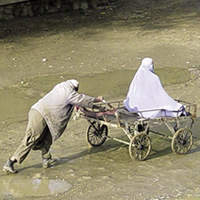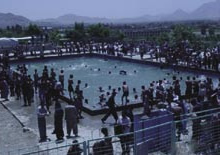by SALAHODIN MAJID
The day Iʼd been waiting for finally came when, after seventeen years away, I got off the plane in Kabul, my native city.
Iʼd been contacted by some journalists from German television in Hanover, where I then lived. They wanted to make a documentary about Afghanistan and they were looking for an Afghani interpreter who spoke Dari and Pashto as well as good German. I fitted the bill – Iʼd lived in Germany since the age of 12 so I have a fluent grasp of the language.
 Was I interested, they asked. Of course I was – how could I turn down the opportunity to travel back to my country, meet my unfortunate people and smell my own countryʼs air again?
Was I interested, they asked. Of course I was – how could I turn down the opportunity to travel back to my country, meet my unfortunate people and smell my own countryʼs air again?
That was how, a month later, we met on a wonderful spring day in Frankfurt airport to catch the Kabul flight. For the first time, after so many years, I saw the name Ariana, the Afghan airline, on the departure board. The sight made me weep and there were other Afghans nearby who seemed to have the same sort of emotion.
There were a lot of nervous looking people on board, because of the Taliban regime, but they were happy too: at long last they would meet their relatives again. After a 12 hour flight, we got to Kabul – a dream came true, I was back in my homeland.
When I got off the plane I was sure that I was home. It just smelled like Afghanistan.
But as we drove into the city, it was like a shattered picture frame, with pieces scattered everywhere and the houses, building, hospitals – everything ruined. Pain and suffering were etched in the faces of every man and woman we came across.
In the spare time from my translating job I managed to visit the school I had attended and there I met some of my classmates, who were now teaching there. As I talked to one of them, I could see from his expression all he had gone through. But he was staring at me and evidently couldnʼt remember who I was. So I introduced myself and said Iʼd been in his class. He was astonished and invited me to his house that night. “Do you recognize me now?” I asked. Yes, he replied, and he remembered that I used to sit next to Ajmal, who was my best friend at the time.
That night, when I caught sight of his house, it seemed perfectly normal. But inside was divided into a warren of small rooms and he lived in one with his wife, four children and sick mother. There were some old bedding and no light and there was one candle, which he lit.
Later I found out they only had one chicken from which they were taking eggs and they had killed it because of me. That made me upset and I was even more so when he told me, hesitatingly, that Ajmal had been killed with all his family. He tried to comfort me: “Thereʼs no point in being upset,” he told me. “I also lost three of my brothers. You were one of the lucky ones who moved abroad while you could. You did not witness the tragedies and humiliation of people murdered more viciously than Vietnam victims.”
 It was one of the most tragic nights of my life and I will never forget it. But a consolation was the Afghani music everywhere I went, which had been banned during the Taliban regime. It was what I used to listen to and indicated that some still had hope; at least they had some time to listen to music, despite all the difficulties and the war. Every step I took, I thanked God that despite everything I was witnessing, I was still very glad to meet my people
It was one of the most tragic nights of my life and I will never forget it. But a consolation was the Afghani music everywhere I went, which had been banned during the Taliban regime. It was what I used to listen to and indicated that some still had hope; at least they had some time to listen to music, despite all the difficulties and the war. Every step I took, I thanked God that despite everything I was witnessing, I was still very glad to meet my people
The interpreting job took me to those parts of the country which I had never seen before: Mazari-Sharif, Jelalabad, Herat, Maymana and many other cities. On one occasion, I interpreted for the Afghan president Hamid Karzai and his cabinet. My first impression was that he was very calm and relaxed – he seemed a perfect gentleman and genuinely interested in where I was living and what I was studying.
At the end of six months, I felt Iʼd helped gather enough material to produce a documentary about the different peoples of Afghanistan and this was screened shortly after our return on German TV. It got an excellent response from viewers.
Looking back, I had the impression that despite the suffering of the Afghan population and what they have been through, the warlords are still taking advantage of the situation by using the support from the West to line their own pockets.
 And Afghanistan remains a country of broken pledges: five years ago the Minster for Water and Energy Ismail Khan was asked during an interview when electric lighting would be restored to Kabul. His answer was in a yearʼs time, but still thereʼs no electricity – just one small example of empty promises and lies.
And Afghanistan remains a country of broken pledges: five years ago the Minster for Water and Energy Ismail Khan was asked during an interview when electric lighting would be restored to Kabul. His answer was in a yearʼs time, but still thereʼs no electricity – just one small example of empty promises and lies.
Even so, the Afghan poor still have hope and one of my enduring memories of the trip was seeing kids splashing about in a muddy pool. One day, I hope, theyʼll have a decent pool and will swim happily there.

 Visaginas, a small town located in the north-east of Lithuania, was built in 1975 mainly for workers of the Ignalinos nuclear power plant and their families to live in. More than six out of ten of its population is Russian, the highest per-centage in the country. During the era of the Soviet Union, when internal borders were open, a lot of Russian nuclear engineering specialists moved to Visaginas, looking for new opportunities and a better quality of life.
Visaginas, a small town located in the north-east of Lithuania, was built in 1975 mainly for workers of the Ignalinos nuclear power plant and their families to live in. More than six out of ten of its population is Russian, the highest per-centage in the country. During the era of the Soviet Union, when internal borders were open, a lot of Russian nuclear engineering specialists moved to Visaginas, looking for new opportunities and a better quality of life. Was I interested, they asked. Of course I was – how could I turn down the opportunity to travel back to my country, meet my unfortunate people and smell my own countryʼs air again?
Was I interested, they asked. Of course I was – how could I turn down the opportunity to travel back to my country, meet my unfortunate people and smell my own countryʼs air again? It was one of the most tragic nights of my life and I will never forget it. But a consolation was the Afghani music everywhere I went, which had been banned during the Taliban regime. It was what I used to listen to and indicated that some still had hope; at least they had some time to listen to music, despite all the difficulties and the war. Every step I took, I thanked God that despite everything I was witnessing, I was still very glad to meet my people
It was one of the most tragic nights of my life and I will never forget it. But a consolation was the Afghani music everywhere I went, which had been banned during the Taliban regime. It was what I used to listen to and indicated that some still had hope; at least they had some time to listen to music, despite all the difficulties and the war. Every step I took, I thanked God that despite everything I was witnessing, I was still very glad to meet my people And Afghanistan remains a country of broken pledges: five years ago the Minster for Water and Energy Ismail Khan was asked during an interview when electric lighting would be restored to Kabul. His answer was in a yearʼs time, but still thereʼs no electricity – just one small example of empty promises and lies.
And Afghanistan remains a country of broken pledges: five years ago the Minster for Water and Energy Ismail Khan was asked during an interview when electric lighting would be restored to Kabul. His answer was in a yearʼs time, but still thereʼs no electricity – just one small example of empty promises and lies.